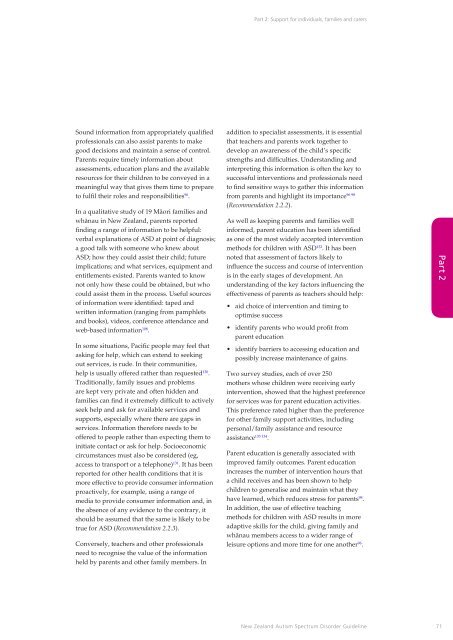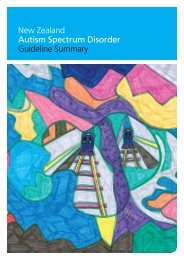New Zealand Autism Spectrum Disorder Guideline - Ministry of Health
New Zealand Autism Spectrum Disorder Guideline - Ministry of Health
New Zealand Autism Spectrum Disorder Guideline - Ministry of Health
You also want an ePaper? Increase the reach of your titles
YUMPU automatically turns print PDFs into web optimized ePapers that Google loves.
Part 2: Support for individuals, families and carers<br />
Sound information from appropriately qualified<br />
pr<strong>of</strong>essionals can also assist parents to make<br />
good decisions and maintain a sense <strong>of</strong> control.<br />
Parents require timely information about<br />
assessments, education plans and the available<br />
resources for their children to be conveyed in a<br />
meaningful way that gives them time to prepare<br />
to fulfil their roles and responsibilities 96 .<br />
In a qualitative study <strong>of</strong> 19 Mäori families and<br />
whänau in <strong>New</strong> <strong>Zealand</strong>, parents reported<br />
finding a range <strong>of</strong> information to be helpful:<br />
verbal explanations <strong>of</strong> ASD at point <strong>of</strong> diagnosis;<br />
a good talk with someone who knew about<br />
ASD; how they could assist their child; future<br />
implications; and what services, equipment and<br />
entitlements existed. Parents wanted to know<br />
not only how these could be obtained, but who<br />
could assist them in the process. Useful sources<br />
<strong>of</strong> information were identified: taped and<br />
written information (ranging from pamphlets<br />
and books), videos, conference attendance and<br />
web-based information 108 .<br />
In some situations, Pacific people may feel that<br />
asking for help, which can extend to seeking<br />
out services, is rude. In their communities,<br />
help is usually <strong>of</strong>fered rather than requested 130 .<br />
Traditionally, family issues and problems<br />
are kept very private and <strong>of</strong>ten hidden and<br />
families can find it extremely difficult to actively<br />
seek help and ask for available services and<br />
supports, especially where there are gaps in<br />
services. Information therefore needs to be<br />
<strong>of</strong>fered to people rather than expecting them to<br />
initiate contact or ask for help. Socioeconomic<br />
circumstances must also be considered (eg,<br />
access to transport or a telephone) 131 . It has been<br />
reported for other health conditions that it is<br />
more effective to provide consumer information<br />
proactively, for example, using a range <strong>of</strong><br />
media to provide consumer information and, in<br />
the absence <strong>of</strong> any evidence to the contrary, it<br />
should be assumed that the same is likely to be<br />
true for ASD (Recommendation 2.2.3).<br />
Conversely, teachers and other pr<strong>of</strong>essionals<br />
need to recognise the value <strong>of</strong> the information<br />
held by parents and other family members. In<br />
addition to specialist assessments, it is essential<br />
that teachers and parents work together to<br />
develop an awareness <strong>of</strong> the child’s specific<br />
strengths and difficulties. Understanding and<br />
interpreting this information is <strong>of</strong>ten the key to<br />
successful interventions and pr<strong>of</strong>essionals need<br />
to find sensitive ways to gather this information<br />
96 98<br />
from parents and highlight its importance<br />
(Recommendation 2.2.2).<br />
As well as keeping parents and families well<br />
informed, parent education has been identified<br />
as one <strong>of</strong> the most widely accepted intervention<br />
methods for children with ASD 132 . It has been<br />
noted that assessment <strong>of</strong> factors likely to<br />
influence the success and course <strong>of</strong> intervention<br />
is in the early stages <strong>of</strong> development. An<br />
understanding <strong>of</strong> the key factors influencing the<br />
effectiveness <strong>of</strong> parents as teachers should help:<br />
• aid choice <strong>of</strong> intervention and timing to<br />
optimise success<br />
• identify parents who would pr<strong>of</strong>it from<br />
parent education<br />
• identify barriers to accessing education and<br />
possibly increase maintenance <strong>of</strong> gains.<br />
Two survey studies, each <strong>of</strong> over 250<br />
mothers whose children were receiving early<br />
intervention, showed that the highest preference<br />
for services was for parent education activities.<br />
This preference rated higher than the preference<br />
for other family support activities, including<br />
personal/family assistance and resource<br />
assistance 133 134 .<br />
Parent education is generally associated with<br />
improved family outcomes. Parent education<br />
increases the number <strong>of</strong> intervention hours that<br />
a child receives and has been shown to help<br />
children to generalise and maintain what they<br />
have learned, which reduces stress for parents 98 .<br />
In addition, the use <strong>of</strong> effective teaching<br />
methods for children with ASD results in more<br />
adaptive skills for the child, giving family and<br />
whänau members access to a wider range <strong>of</strong><br />
leisure options and more time for one another 96 .<br />
Part 2<br />
<strong>New</strong> <strong>Zealand</strong> <strong>Autism</strong> <strong>Spectrum</strong> <strong>Disorder</strong> <strong>Guideline</strong> 71











